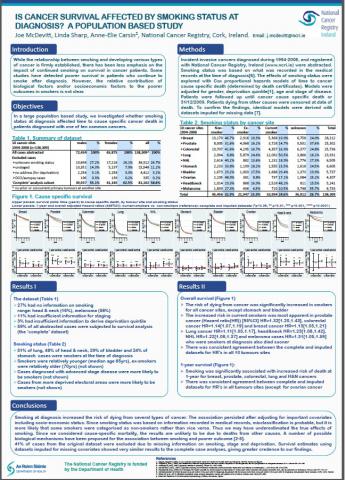Current Size: 100%
Is cancer survival affected by smoking status at diagnosis? A population-based study
Error message
Warning: mkdir(): Permission denied in boost_mkdir() (line 1407 of sites/all/modules/boost/boost.module).IS CANCER SURVIVAL AFFECTED BY SMOKING STATUS AT DIAGNOSIS?
A POPULATION-BASED STUDY
Background: A few small studies suggest that smoking may be associated with poorer outcomes in cancer patients. In a large, population-based study, we investigated whether smoking status at diagnosis affected survival in people diagnosed with: cancers of the breast, prostate, colorectum, lung, stomach, bladder, ovary, and head and neck (H&N), non-Hodgkin lymphoma (NHL) and melanoma.
Methods: We abstracted cancers diagnosed 1994-2008 from the National Cancer Registry Ireland. Follow-up was until 31/12/2009. Cox proportional hazards models were used to compare risk of cancer-specific death in current or ex-smokers versus non-smokers, adjusting for other prognostic factors (including age, stage, and deprivation category).
Results: 81,102 cases were included in the analysis. Current smokers were at increased risk of dying from cancer, for all sites, with the exception of stomach and bladder: (adjusted HR[95%CI] prostate=1.32[1.21,1.43]; colorectal=1.14[1.08,1.20]; breast=1.13[1.05,1.21]; lung=1.11[1.04,1.17]; H&N=1.24[1.08,1.42]; NHL=1.22[1.08,1.37], and melanoma=1.31[1.06,1.61].
Conclusions: Smoking at diagnosis increased the risk of dying from several cancers. Smoking status misclassification was likely, with some smokers probably recorded as non-smokers; thus the true effects of smoking may have been underestimated. These results could be explained by the effects of smoking on immune competence, inflammatory response, genetic damage, or metabolism of chemotherapy drugs.






